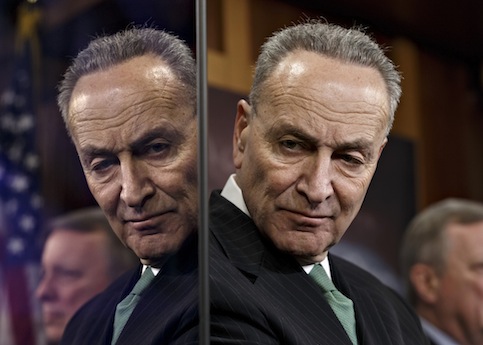Experts criticized a top Senate Democrat this week for pushing the federal government to ban a food additive that regulators say is safe at the behest of a food blogger whose campaign against the chemical has spurred a public outcry.
Subway announced on Monday that it would drop the additive azodicarbonamide from its food. It had used the chemical as a bleaching agent in its sandwich breads.
The decision spurred Sen. Chuck Schumer (D., N.Y.), the Senate’s third-ranking Democrat, to call for the Food and Drug Administration (FDA) to completely ban azodicarbonamide, which is still used by a number of restaurants, including McDonald’s.
"McDonald's bread is so full of azodicarbonamide so that billions and billions served could really be billions and billions served toxic chemicals," Schumer said.
The campaign is due in large measure to the efforts of blogger and self-styled "food babe" Vani Hari, who has whipped readers of her site into a frenzy about the additive, encouraging them to contact companies that use azodicarbonamide in their food to demand that they cease doing so.
"Subway is using this ingredient as a bleaching agent and dough conditioner which allows them to produce bread faster and cheaper without regard to … health consequences," Hari claimed on a petition page on her blog.
More than 88,000 people had signed the petition, which calls on Subway to drop the additive from its breads, as of Tuesday morning.
The petition cited a 1999 study by the World Health Organization (WHO) as evidence of azodicarbonamide’s hazards to human health, but the study does not appear to support her case, and may in fact bolster claims that the additive is safe for consumption in food products.
The most acute dangers from the chemical, the study found, come from "occupational exposure conditions" in businesses that use azodicarbonamide as a "blowing agent" in the production of foamy materials.
That includes businesses that manufacture yoga mats, which have formed a key talking point in Hari’s and Schumer’s case for an outright FDA ban.
"Azodicarbonamide is the same chemical used to make yoga mats, shoe soles, and other rubbery objects," Hari wrote. "It’s not supposed to be food or even eaten for that matter."
Food regulation experts said that that talking point misrepresents the issue.
Schumer and Hari "appear to have it backward," said Wayne Crews, vice president for policy at the Competitive Enterprise Institute and a former FDA economist.
"It’s not that McDonald’s decided to use chemicals found in yoga mats and tennis shoes in its bread dough," Crews explained. "Rather, yoga and shoe companies happen to use a plain old food additive in their products."
The WHO study cited by Hari found that exposure in the production of yoga mats and similar foamy materials is actually where potential danger to human health lies, not in the oral consumption of azodicarbonamide via food products.
"There is evidence to suggest that azodicarbonamide has been added to consumer products such as bread and beer," the study found. "The limited toxicology database and lack of exposure data make it difficult to adequately assess the risk to humans potentially exposed; hence, there is a need for further information."
Where azodicarbonamide has been tested on animals, the study noted, the level of exposure needed to cause noticeable health deterioration is massive.
WHO highlighted one study in which guinea pigs were given "repeated oral exposures" of quantities of azodicarbonamide equivalent to more than a fifth of their bodyweight every day for up to a year before health problems arose.
Exposure levels are crucial in determining the safety of food additives. FDA’s determination with respect to azodicarbonamide says that the additive is safe "as an aging and bleaching ingredient in cereal flour in an amount not to exceed 2.05 grams per 100 pounds of flour (0.0045 percent; 45 parts per million)."
No one has accused Subway of violating that limit. Hari and Schumer insist the presence of azodicarbonamide in any quantity is unacceptable.
The FDA defended its determination in an email on Tuesday.
"As part of FDA's overall commitment to ensure the safety of the food supply, the agency uses an extensive, science-based process to evaluate the safety of food additives," wrote agency spokeswoman Theresa Eisenman.
"Under FDA regulations, safety for food additives means that there is a reasonable certainty of no harm when an additive is used within the intended conditions of use," Eisenman explained.
Jeff Stier, a senior fellow at the National Center for Public Policy Research, noted that numerous chemicals that are hazardous in large quantities are nonetheless FDA-approved, because they are safe for human consumption in the small quantities that are often used in food, drugs, or other common consumer goods.
"I am concerned that the activists have set the standard so low … that before you know it, we'll have calls to disassemble modern food production, going after a different FDA-approved ingredient each week," Stier said in a statement on Monday.
Schumer and Hari, Stier said, "exhibit reckless disregard for science-based food policy. … If this is the new standard, obesity isn't going to be a problem anymore—starvation is."
